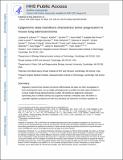Epigenomic State Transitions Characterize Tumor Progression in Mouse Lung Adenocarcinoma
Author(s)
LaFave, Lindsay M.; Kartha, Vinay K.; Ma, Sai; Meli, Kevin; Del Priore, Isabella; Lareau, Caleb; Naranjo, Santiago; Westcott, Peter M.K.; Duarte, Fabiana M.; Sankar, Venkat; Chiang, Zachary; Brack, Alison; Law, Travis; Hauck, Haley; Okimoto, Annalisa; Regev, Aviv; Buenrostro, Jason D.; Jacks, Tyler; ... Show more Show less
DownloadAccepted version (2.848Mb)
Publisher with Creative Commons License
Publisher with Creative Commons License
Creative Commons Attribution
Terms of use
Metadata
Show full item recordAbstract
Regulatory networks that maintain functional, differentiated cell states are often dysregulated in tumor development. Here, we use single-cell epigenomics to profile chromatin state transitions in a mouse model of lung adenocarcinoma (LUAD). We identify an epigenomic continuum representing loss of cellular identity and progression toward a metastatic state. We define co-accessible regulatory programs and infer key activating and repressive chromatin regulators of these cell states. Among these co-accessibility programs, we identify a pre-metastatic transition, characterized by activation of RUNX transcription factors, which mediates extracellular matrix remodeling to promote metastasis and is predictive of survival across human LUAD patients. Together, these results demonstrate the power of single-cell epigenomics to identify regulatory programs to uncover mechanisms and key biomarkers of tumor progression.
Date issued
2020-08Department
Koch Institute for Integrative Cancer Research at MIT; Massachusetts Institute of Technology. Department of Biology; Howard Hughes Medical InstituteJournal
Cancer Cell
Publisher
Elsevier BV
ISSN
1535-6108